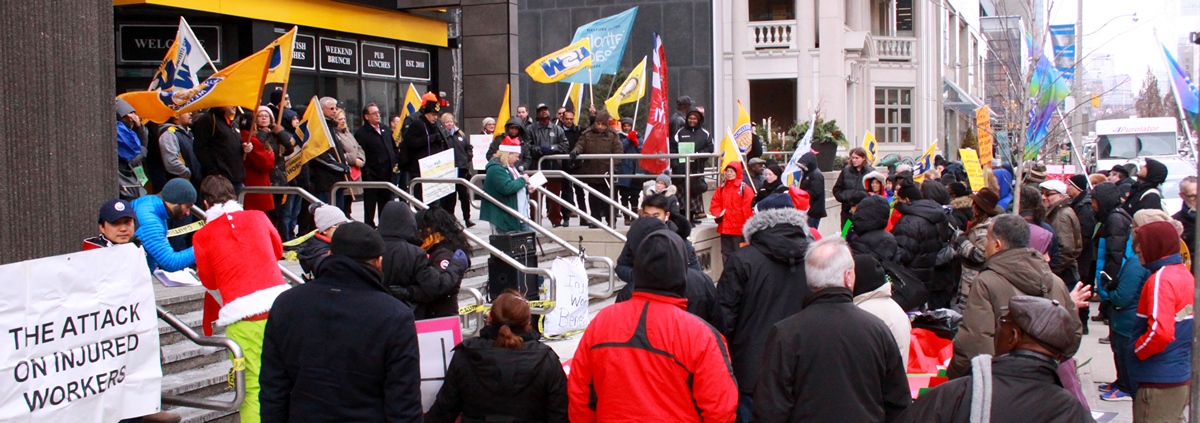|
December 13, 2018
The Rights of
Unemployed Workers
Must Be Recognized and Upheld
Seasonal Workers
in Quebec and
New Brunswick Demand Adequate
Employment Insurance Benefits
- Pierre
Chénier -
PDF
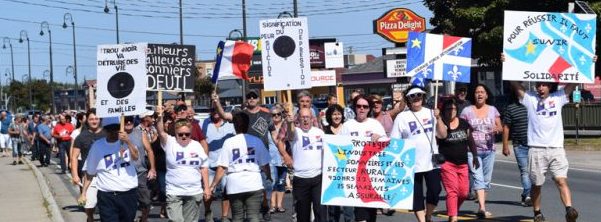
Demonstration by seasonal workers in Tracadie, September 15, 2018.
Interviews
• Line Sirois, Coordinator, Action
Chômage Côte-Nord
• Fernand Thibodeau, Spokesperson, Action
Committee on Employment
Insurance for Seasonal Workers in New Brunswick
Opposition to
Back-to-Work Legislation
• Postal Workers and Allies Take Action
Against Bill C-89
Ontario Injured
Workers Demand Justice
• Spirited Actions Affirm "Workers' Comp Is a
Right"
The Rights of Unemployed Workers Must Be
Recognized and Upheld
Seasonal Workers in Quebec and New Brunswick Demand
Adequate Employment Insurance Benefits
- Pierre Chénier -
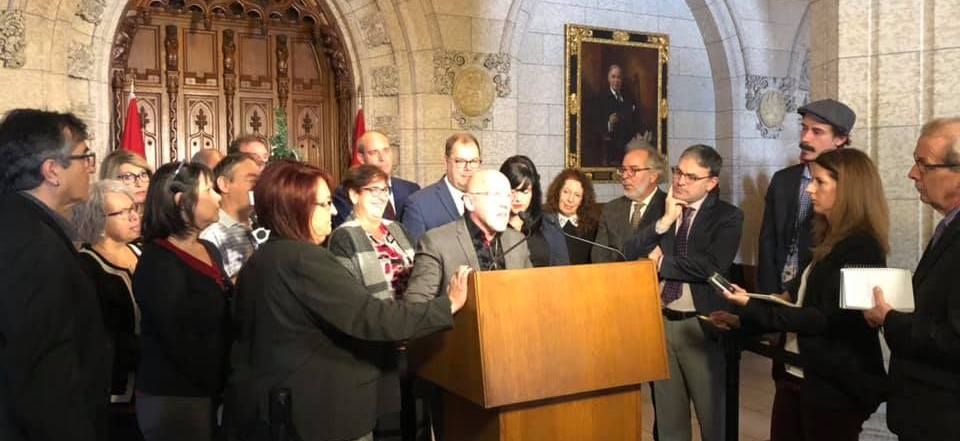
On December 4, unemployed groups, unions, municipal
elected officials and seasonal industry employers from the Acadian
Peninsula in New Brunswick and the Charlevoix, Côte-Nord and
Bas-St-Laurent regions of Quebec, held a press conference in the foyer
of the House of Commons in Ottawa, to highlight the difficult
conditions experienced by seasonal workers and to call for solutions
that enable them to live in dignity.
In particular, they addressed the federal government's
recent decision to grant five weeks of additional employment insurance
benefits to workers in 13 regions that have a higher proportion of
seasonal claimants and higher than average unemployment rates in 2017.[1] They said that
this
pilot project is totally insufficient to cover even the immediate needs
of seasonal workers to enable them to avoid the "black hole," the
period during which workers have exhausted their benefits and are not
yet back to their seasonal work. It should be noted that this pilot
project only applies to seasonal workers who, in the previous five
years, had
at least three claims in which they received regular or fishing
benefits. In addition, at least two of those claims must have started
around the same time of year. Many seasonal workers in targeted regions
will not even be eligible for these five weeks.
The groups participating in the press conference called
for a revision of the Employment Insurance system to redefine the
regions on the basis of actual conditions, so that regions with a
predominantly seasonal industry are declared protected areas and
provided with exceptional measures: an eligibility criterion
of 420 hours, a floor
of 35 weeks of benefits and a divisor of 12 so that the
best 12 weeks of wages would be used to assess the seasonal
worker's benefits. The amount of the benefit is currently set
at 55
per cent of the wage.
The federal government has not responded, other than by
its usual words that it has already given a lot to the Employment
Insurance system and is "listening" to the demands and concerns of the
workers.
It has not taken any responsibility for the development
of these regions, to ensure they have a diversified economy, with a
vibrant manufacturing sector, social programs and public services,
where workers and local people have a decisive say in the development
of the economy.
The government has also taken no responsibility for the
development of a universal Employment Insurance plan where the
conditions of eligibility and the duration and benefit amounts would be
such that all workers would be assured that they could live decently at
a modern standard.
Neither has it taken responsibility to eliminate the
blatant arbitrariness by which EI economic regions are established,
regardless of the real conditions of the economy and of the workers. An
arbitrary unemployment rate is then given to the region for a given
period. This situation destabilizes the lives of the workers as it
constantly changes the
conditions of eligibility, duration and amount of benefits, which
particularly affects seasonal workers.
Finally, the government has taken no responsibility to
address the demand of seasonal workers to redefine regions, and to
protect regions where seasonal industry predominates.
The organizers of the press conference left Parliament
determined to continue and expand the battle for the rights of
unemployed workers.
The unemployed must receive compensation that allows
them to live at a Canadian standard. It was not the workers who
destroyed the manufacturing sector in their regions and created these
unstable conditions in their economy. The standard of living of workers
and communities must be supported as a matter of justice and reparation
from a
system that does not provide a means of subsistence for all. This is
what the federal government wants to avoid with its consultations and
statements that it "understands the situation of the unemployed." It
wants to find ways to maintain the regime's arbitrariness and force
workers to move in the name of what it calls "labour mobility,"
"flexibility," and other expressions that are meant to cover
up anti-social anti-worker arrangements.
What it means in fact is the uprooting of people to create a disposable
workforce for the benefit of the monopolies.
This is unacceptable and must not pass.
Note
1. The thirteen regions targeted
by this measure are:
Bas-Saint-Laurent -- Côte-Nord (Quebec)
Central Quebec
Charlottetown (Prince Edward Island)
Chicoutimi-Jonquiere (Quebec)
Eastern Nova Scotia
Gaspésie -- Îles-de-la-Madeleine (Quebec)
Madawaska -- Charlotte (New Brunswick)
Newfoundland / Labrador (excludes capital)
North Western Quebec
Prince Edward Island (excludes capital)
Restigouche -- Albert (New Brunswick)
Western Nova Scotia
Yukon (excludes capital)

Interviews
Line Sirois, Coordinator,
Action Chômage Côte-Nord
 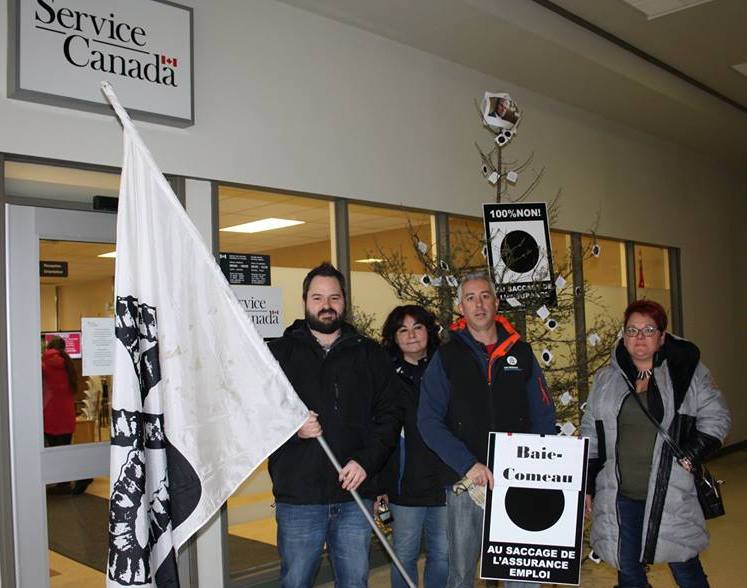
Actions were held at Service Canada offices in a number of locations in
Quebec on November 29, 2018 to demand action. The above actions were in
Forestville (left) and Baie Comeau.
The problem is not solved for seasonal workers who have
not worked enough weeks to avoid the black hole. For these workers, the
EI benefits end before they go back to work. We are facing this
phenomenon in many parts of Quebec and the rest of Canada, especially
in
Eastern Canada. There has been a new announcement of five more
weeks of benefits for a number of EI economic regions, but that is not
enough. Here on Côte-Nord, if people work 530 hours as
required to qualify for Employment Insurance, they receive 17
weeks of benefits. If we add five weeks, that's 22, but it still
falls several weeks short of the time for which workers have no income.
The government has put training in place for these workers, but
we are telling the government that training is not what we need, we
have the right to get what we need to live. Workers should not be
penalized because they do not control when work begins and ends. When
winter comes, many people no longer have access to their jobs.
Nobody is able to live with a black hole. Heating, electricity,
groceries, you have to pay for them even if you have no income.
We went to Ottawa on December 4 and we asked all
the opposition parties to support us in denouncing the situation and
asking the government to give more. We had with us groups of unemployed
people, unions, the mayor of Tadoussac, a worker from Tadoussac who
came to denounce the situation because this situation will put
companies at risk, it will create a terrible shortage of labour because
people are leaving the area. The migration from the region is very
high, one of the largest in Quebec. The population here is aging, so we
have big problems with labour shortages, especially during the active
period, which is the summer period. The Liberals gave us the same
kind of words they always do. They say that they have already done a
lot for Employment Insurance, that they have already given to seasonal
workers. They did not make any commitments.
What we got with these five additional weeks is a
bandage on the wound. Five weeks is not enough because our real
unemployment rate is terribly falsified by the statistics. It is an
unacceptable prejudice, that the situation is calculated according to
the unemployment rate that is established according to the EI economic
region of which we are
part, which has nothing to do with the actual unemployment rate on the
Haute Côte-Nord. The government has established the region's
unemployment rate at 7 per cent while the real unemployment rate
for the
Haute Côte-Nord is 20 per cent. It is a false calculation,
which
does not take into account the jobs that exist in the region.
We are asking that areas with seasonal economies be
declared protected areas and that seasonal workers in these regions
benefit from exceptional measures: 420 hours of work to
qualify, 35 weeks of benefits and a divisor of 12 weeks. Our
entire coalition has that same demand.
Our coalition is growing all the time. We were only the
North Shore, now we have Charlevoix, the National Council of the
Unemployed (CNC), regions like the Acadian Peninsula in New Brunswick
that have the same problem as us. Other regions throughout Eastern
Canada have a similar problem. If we have to bring all those people
together to get the government to listen we are going to do it. We will
not give up. We will keep fighting.
  
November 29, 2018 actions in (left to right) Rimouski, Tracadie and La
Malbaie.

Fernand Thibodeau, Spokesperson,
Action Committee on Employment Insurance for Seasonal Workers in New
Brunswick

A public assembly of seasonal workers on the Acadian
Peninsula and in rural areas of New Brunswick, held September 10, 2018
in Inkerman, formalized an alliance between workers in Quebec and New
Brunswick to wage a common fight to eliminate the Black Hole.
We have a problem here called the black hole. We are
part of a region that is called Restigouche-Albert, which is very large
and reaches almost to Moncton, includes the entire Acadian Peninsula
and
almost goes to Campbellton. This is an EI region that has not been
studied by the federal government for 10 years, which must be
revised,
because it does not correspond to the actual conditions of the seasonal
industry. Under the
current conditions of the statistically-established unemployment rate
for the region, workers must work 490 hours to receive 23
weeks of employment insurance. This does not correspond to the reality
of work in the fishing industry, picking blueberries, the peat
industry, construction and even tourism that do not function in the
winter. People cannot get reasonable employment insurance, so they live
in the black hole.
We held a lot of demonstrations, did a lot of
interviews. We have organized activities to raise the awareness of the
federal government and to make the provincial government aware because
if the economy is sick in a province, I think it is up to the
provincial doctor to knock on the door of the federal specialist to
find a solution to the
problem of the economy that we are facing here. Seasonal workers
represent 60 per cent of New Brunswick's economy. The economy is
not in good shape. The province has to do something too. It affects
everyone's situation.
We are asking the federal government to review the
Restigouche-Albert region, and to revise all regions, and to make
protected areas in regard to seasonal industry when this industry is
largely predominant, with 420 hours of work to qualify tor
EI, 35 weeks of benefits and a divisor of 12 weeks.
We do not agree that the government, which is not the
one that finances the EI system, is putting punitive systems in place
and making decisions that are inappropriate for seasonal workers. Our
population is aging, many people are retiring. The region as it is
defined statistically is much too big. It has to be studied again and
revised. Many
people are losing their homes, their cars; many are in a state of
crisis. The government must act quickly for seasonal regions. With
respect to training programs, they do not reflect what is happening in
the seasonal economy. They do nothing to fix the problem of the black
hole.

Opposition to Back-to-Work Legislation
Postal Workers and Allies Take Action
Against Bill C-89
Postal workers and their allies are continuing their
ongoing campaign demanding that Bill C-89,
the legislation ordering postal workers back to work, be withdrawn and
the contract with Canada Post be settled by negotiations and not
government dictate.
On December 12, more than one hundred people gathered at
Canada Post Headquarters in Ottawa to demand that Canada Post listen to
the just demands of postal workers. At 1:30 pm, Canada Post was holding
its Annual General Meeting and postal workers, accompanied by members
of the Canadian Union of Public Employees, Unifor, the Public Service
Alliance of Canada, the Ontario Public Service Employees Union, the
Ontario Secondary School Teachers' Federation, the Union of Postal
Communications Employees as well as executive officers from the
Canadian Labour Congress and the Ottawa District Labour Council marched
to Canada Post to have their say about the violation of their right to
negotiate their wages and working conditions.

Picket outside Canada Post's AGM, Ottawa, Decmber 12, 2018, is
addressed by former CUPW President Jean-Claude Parrot.
Speakers from the unions present, as well as community
groups, expressed their full solidarity with the fight postal workers
were waging against the Trudeau government's imposition of Bill C-89
which interferes in the negotiations process and criminalizes the
workers.
Mike Palacek, National President of the Canadian Union
of Postal Workers, emphasized that postal workers had just gone through
36 days of rotating strikes, now declared illegal by the Trudeau
government, but the struggle was not over. He vowed that the union,
with
its allies all over the country, would continue the fight for health
and
safety, proper wages and elimination of precarious work at the post
office.
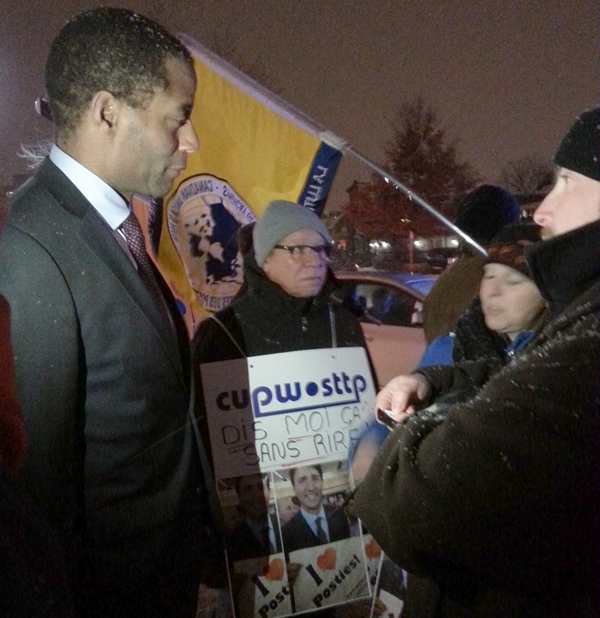  
Ottawa, December 11, 2018.
On December 11, postal workers from Gatineau and Ottawa
and members of community groups picketed a Liberal Party fundraising
event at the Canadian Museum of History.
At one point, Greg Fergus, Liberal MP for Hull-Aylmer,
spoke with the workers to convince them that the arbitration process
would be beneficial for the workers. This was angrily rejected by the
workers who pointed out that it is their right to have a say in their
working conditions and this was being violated by the dictate of the
Liberal
Government.
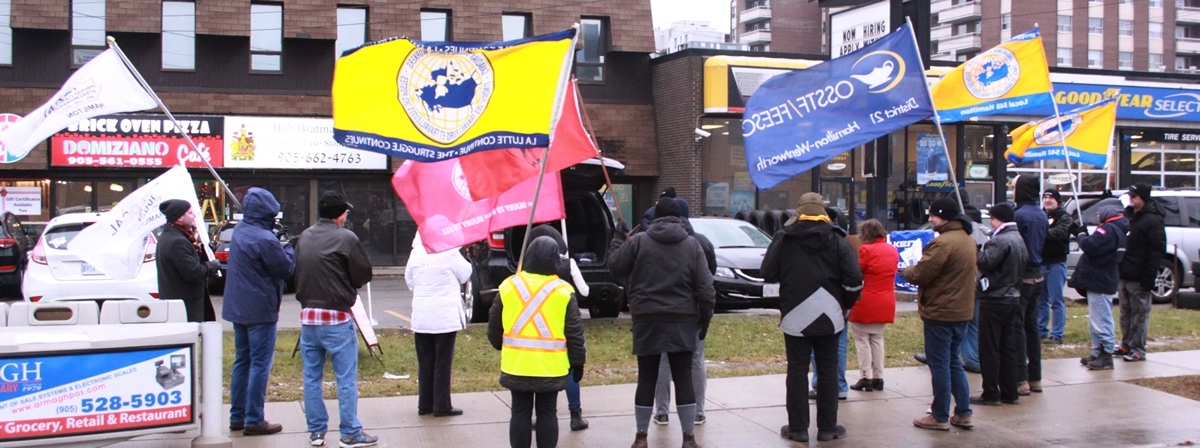
Picket outside MP Bratina's office, Hamilton, December 6, 2018.
In Hamilton the Labour Council organized a picket
outside of Liberal MP Bob Bratina's office on December 6. Postal
workers, United Steelworkers Local 1005, OSSTF and others gathered
to let the Liberal government know they oppose the back-to-work
legislation.
Speaking at the action President of the Hamilton and
District Labour Council Anthony Marco stated that this legislation
denying postal workers their right to strike is an attack on the rights
of all workers and opposing it is everyone's fight.
Randy Drees, Second Vice-President of CUPW
Local 548 Hamilton pointed out that the Trudeau government is
sending the postal workers back to the same unsafe working conditions
and inequality that they have been negotiating to correct for over a
year. Far from addressing the workers' legitimate concerns, the
government is
addressing those of corporate giants like Amazon and eBay who told
Trudeau they do not want their profits touched.
Dennis Van Meer, Vice President of United Steelworkers
Local 1005, noted Trudeau claims the back to work legislation was
necessary because the rotating strikes were hurting the economy. GM
announced the closure of the Oshawa auto plant. This hurts the economy.
The Trudeau government has negotiated a new NAFTA agreement,
the USMCA, without the removal of the tariffs on steel and aluminium.
This hurts the economy. Where is the defence of the rights and well
being of the workers, he asked.
Postal workers and their supporters have vowed to carry
on the fight against this unjust legislation and further actions are
planned across the country.

Ontario Injured Workers Demand Justice
Spirited Actions Affirm "Workers' Comp Is a Right"
Rallies and pickets on Monday, December 10 in Toronto,
Barrie, Thunder Bay and London kicked off the Ontario Network of
Injured Workers' Group's (ONIWG) week of actions across the province
held as part of their ongoing "Workers' Comp Is a Right!" campaign.
Actions took place in Niagara, Hamilton and Windsor on December 11 and
12 and the week wraps up in Sudbury with a picket at the WSIB on
Friday, December 14.
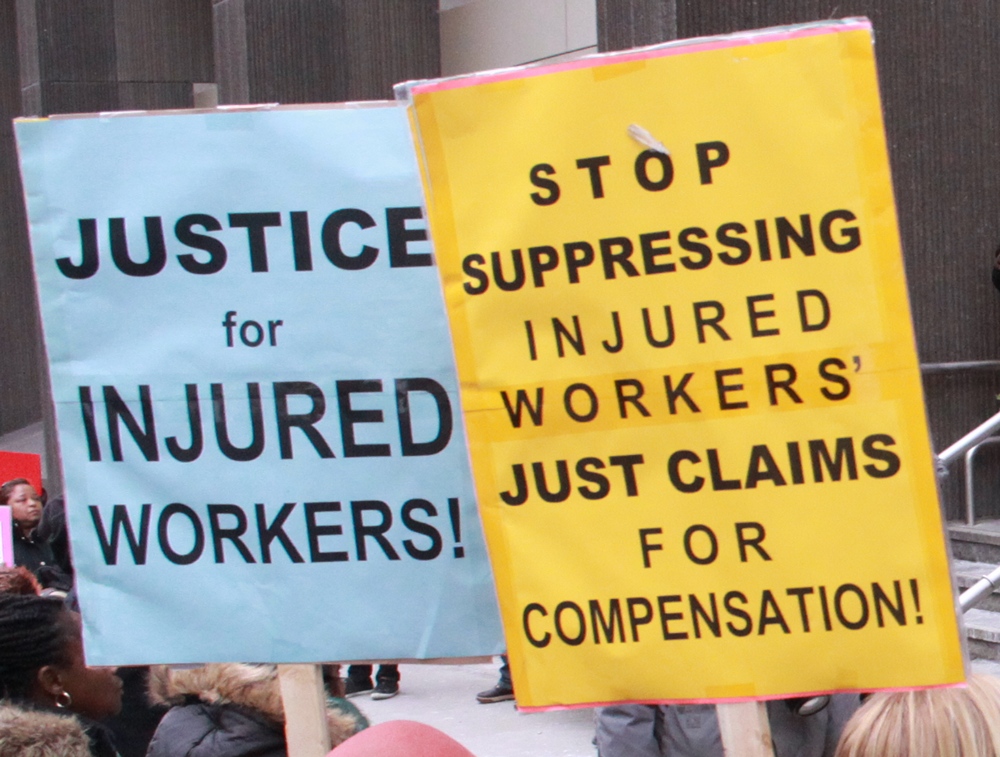 In Toronto some 150
people participated in a rally outside the Ontario Ministry of Labour.
Injured worker activists from the ONIWG were joined by contingents from
the Toronto Council of
the United Steelworkers, UFCW, OPSEU, the Toronto local of CUPW, the
South Asian Women's
Rights Organization and the Workers' Centre of CPC(M-L), among others. In Toronto some 150
people participated in a rally outside the Ontario Ministry of Labour.
Injured worker activists from the ONIWG were joined by contingents from
the Toronto Council of
the United Steelworkers, UFCW, OPSEU, the Toronto local of CUPW, the
South Asian Women's
Rights Organization and the Workers' Centre of CPC(M-L), among others.
The December action returned to the Ministry of Labour
this year after two years at other locations to express the
determination of injured workers to fight the Conservative government's
attacks on workers' rights. In the case of injured workers, this has
taken the form of $1.5 billion in premium rebates to employers, while
more and more injured workers are denied the compensation they are due.
Throughout the rally both the injured workers and union
representatives who spoke gave many examples of the ways in which the
claims of injured workers are being denied, and their doctors' advice
ignored to the serious detriment of their health. They emphasized the
importance of fighting from the starting point that workers have a
right to
full compensation when injured and a right to the health care they
require to recover fully.
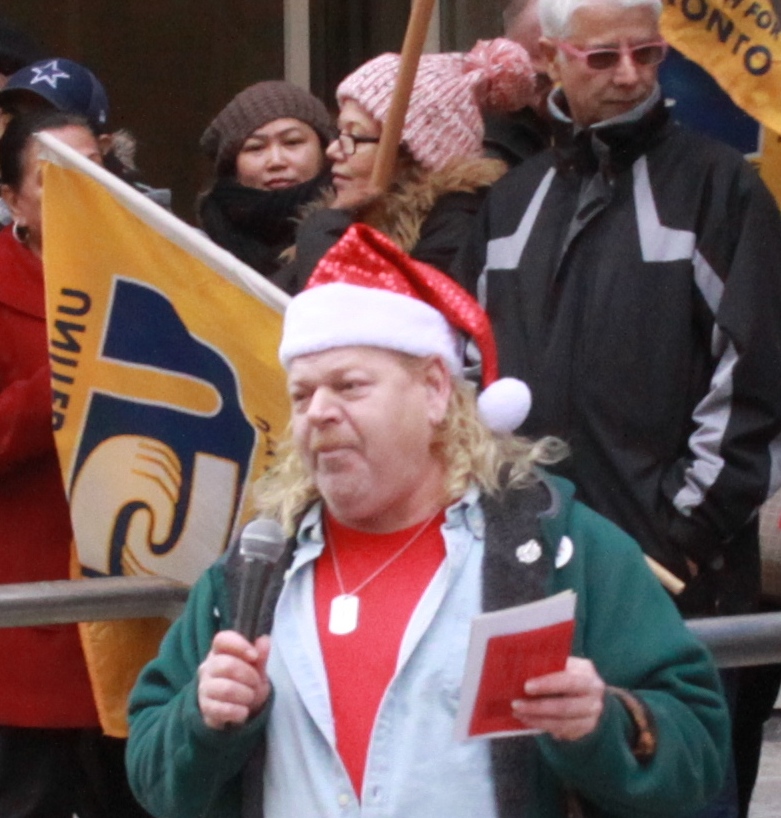 ONIWG President Willie
Noiles pointed to the police presence at the action for the first time,
including the unsuccessful attempt to keep the rally off the Ministry
of Labour's stairs, and the fact the Minister of Labour did not attend,
as indicative of the contempt which the current Ontario government has
for injured workers and working
people. ONIWG President Willie
Noiles pointed to the police presence at the action for the first time,
including the unsuccessful attempt to keep the rally off the Ministry
of Labour's stairs, and the fact the Minister of Labour did not attend,
as indicative of the contempt which the current Ontario government has
for injured workers and working
people.
The speaker from OPSEU, who works as a health and
safety inspector, pointed out that when the Premier speaks of cutting
back on 350,000 regulations to make "Ontario Open for Business," when
it comes to health and safety regulations, each one is written in the
blood of workers who have been injured or killed on the job. The
regulations are there to save lives and the government workers will not
stand by while these regulations are eliminated, he said.
A speaker from CUPW was warmly welcomed in recognition
of the determined fight the postal workers are waging. She pointed out
that one of the main questions on which postal workers would not back
down during the past year in negotiations was their determination to
improve their health and safety conditions. Due to restructuring by
Canada Post they now have the highest injury rate in the federal
sector. The back-to-work legislation brutally forced them back into
these exact same unsafe working conditions.
Toronto

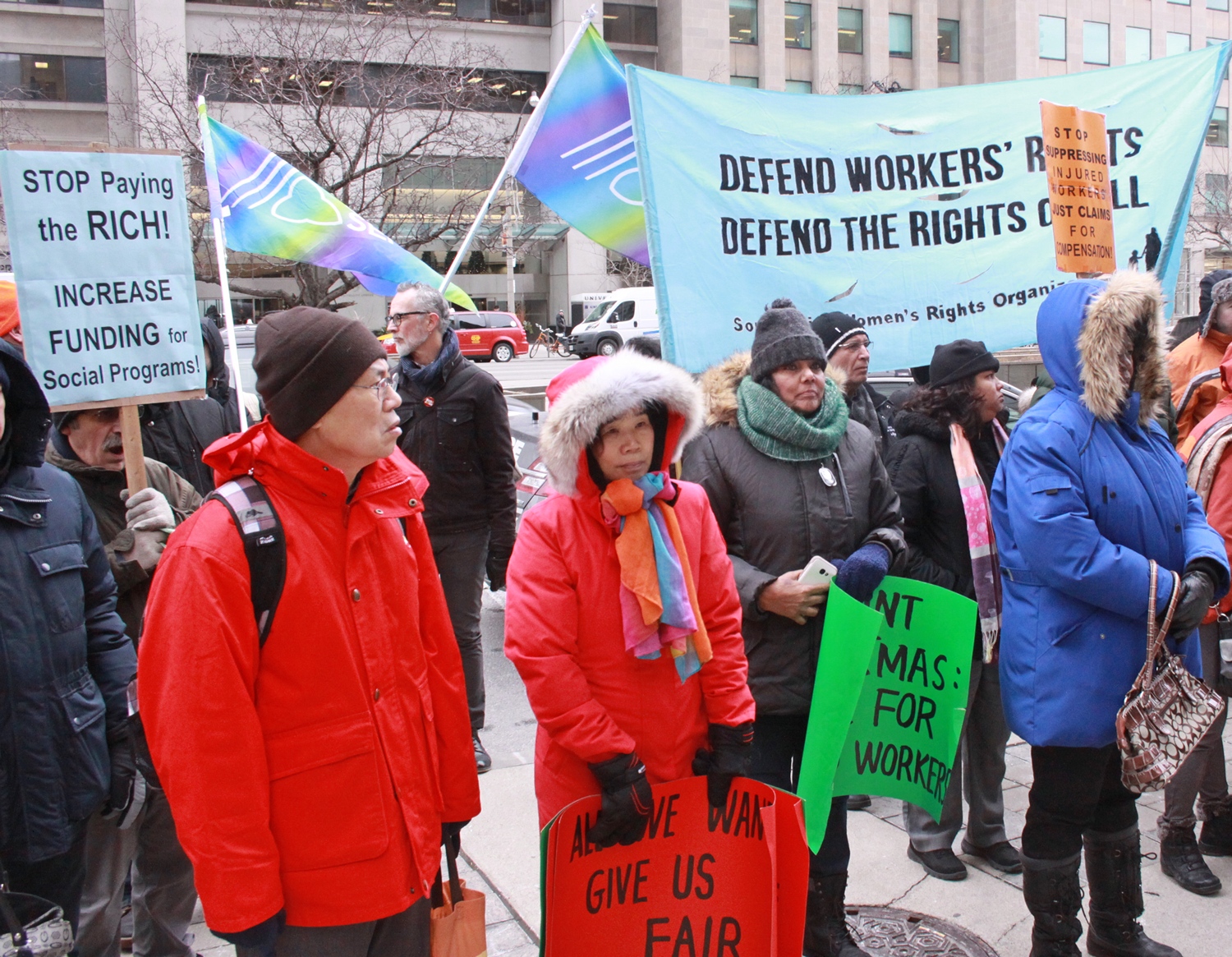 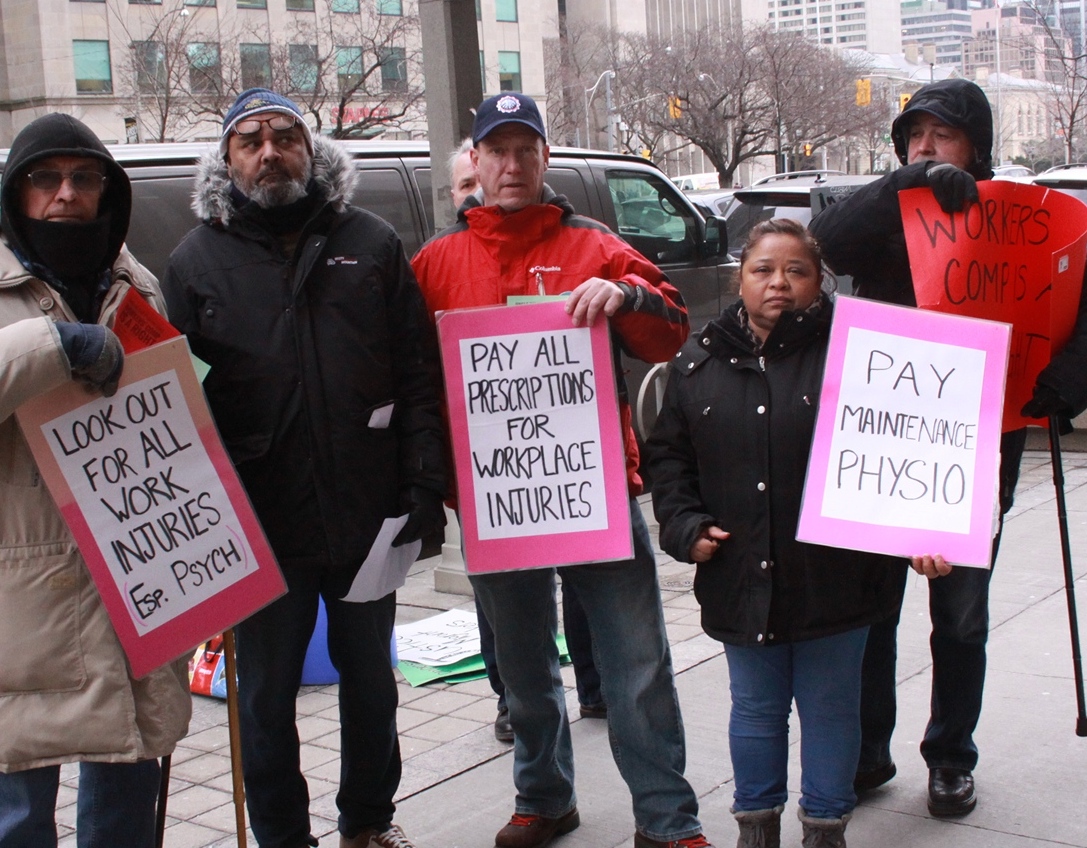
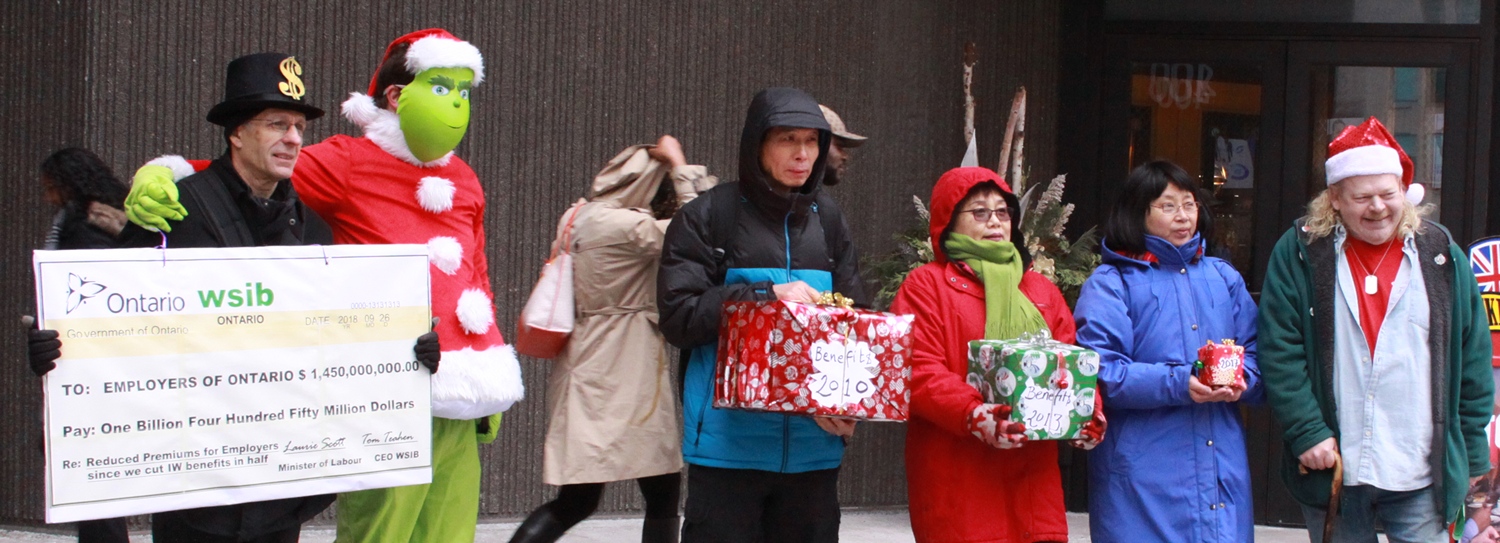
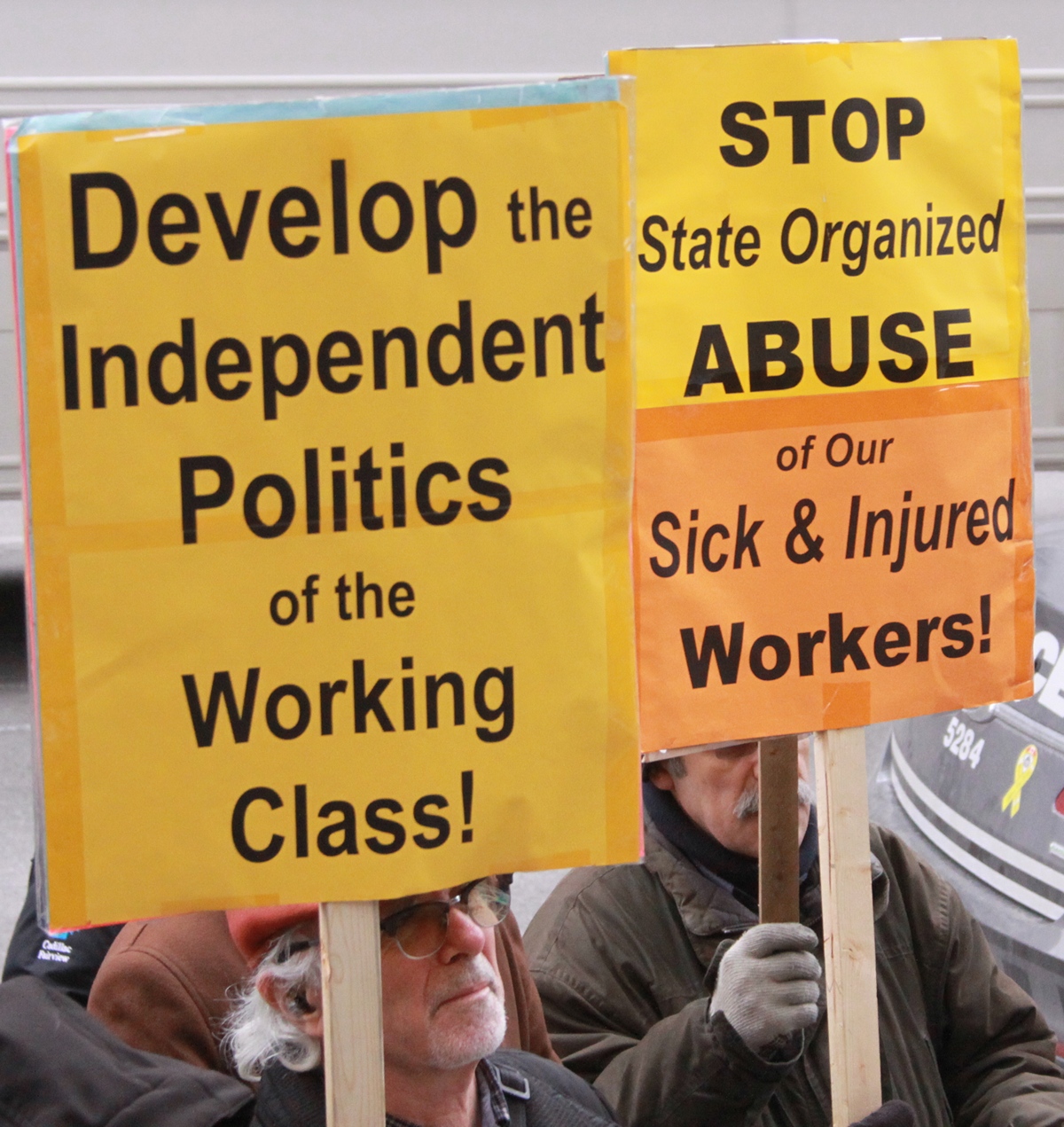 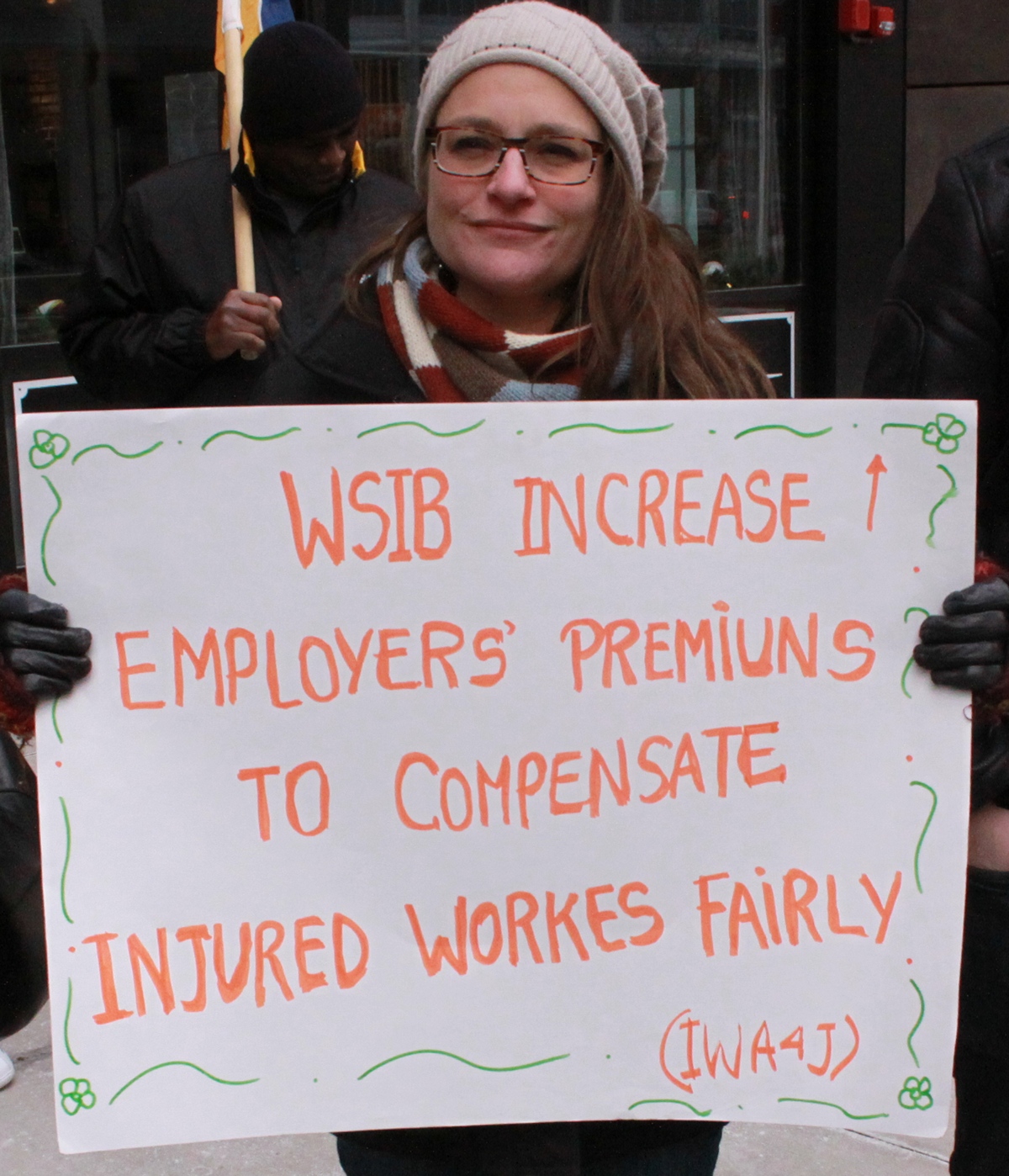 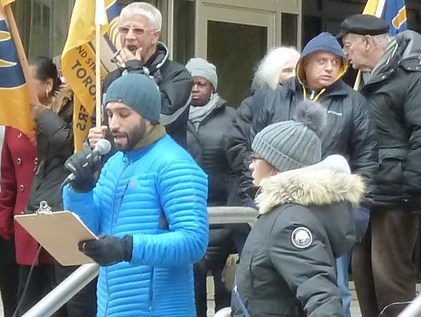
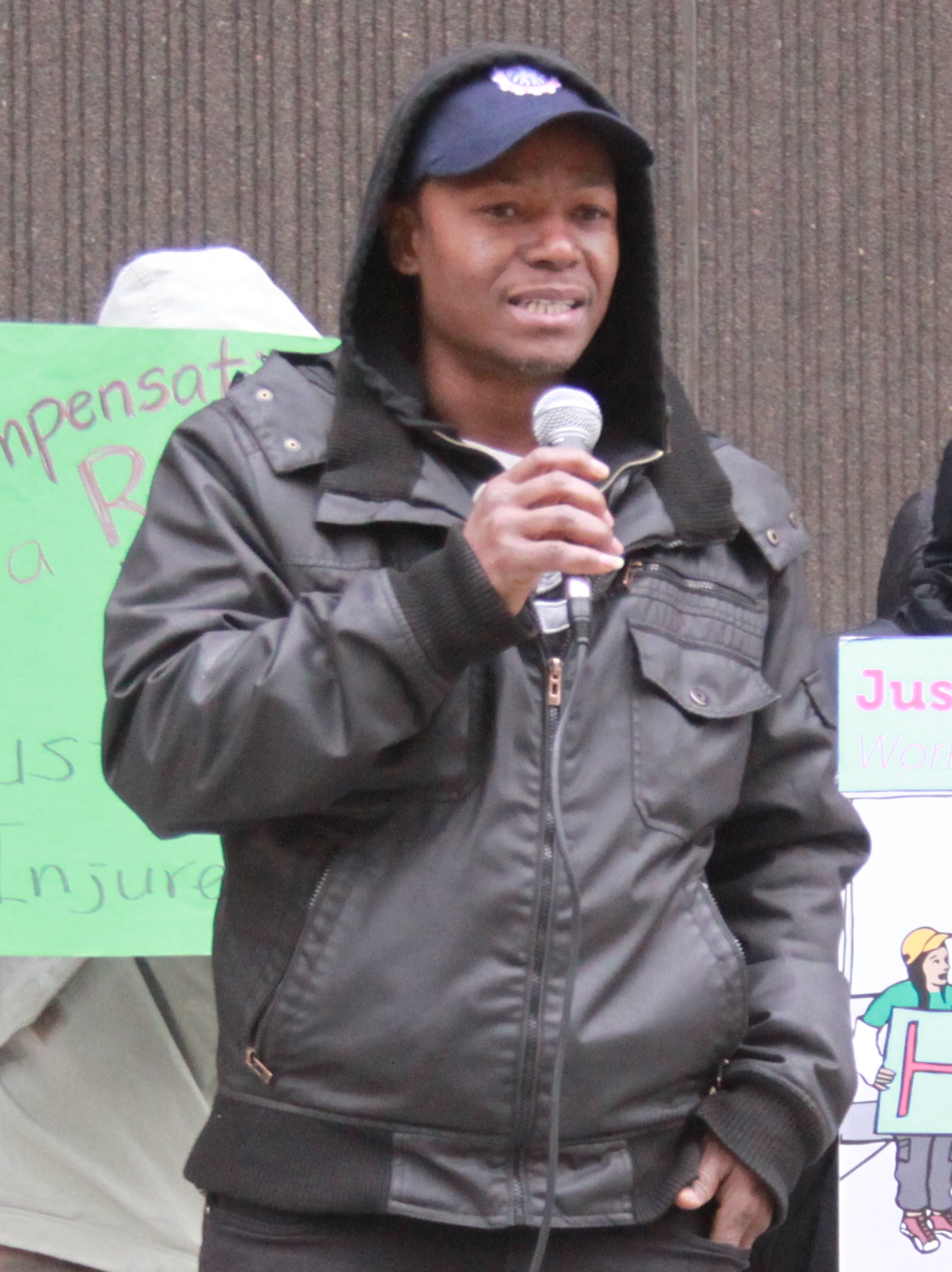 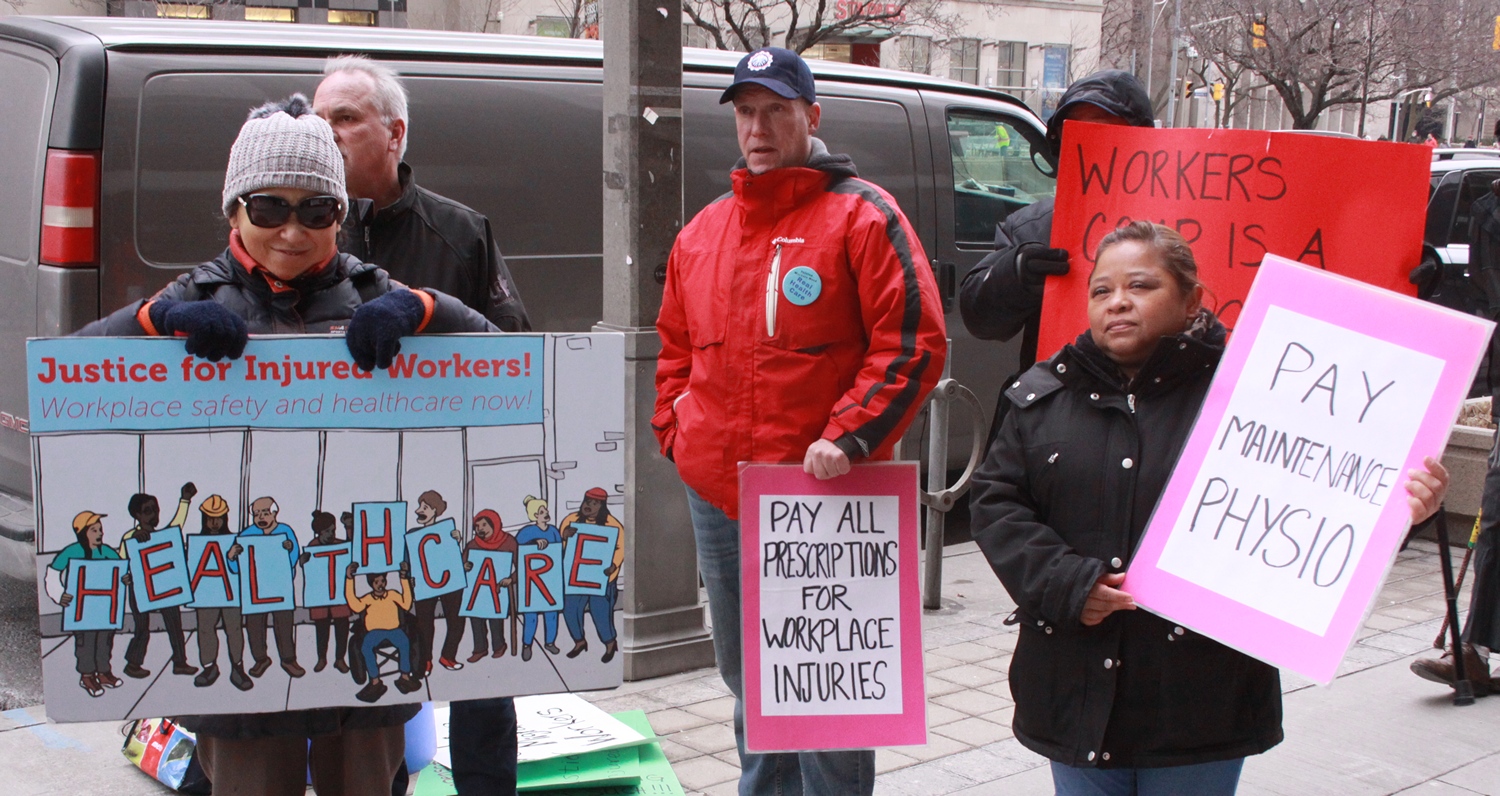
Hamilton
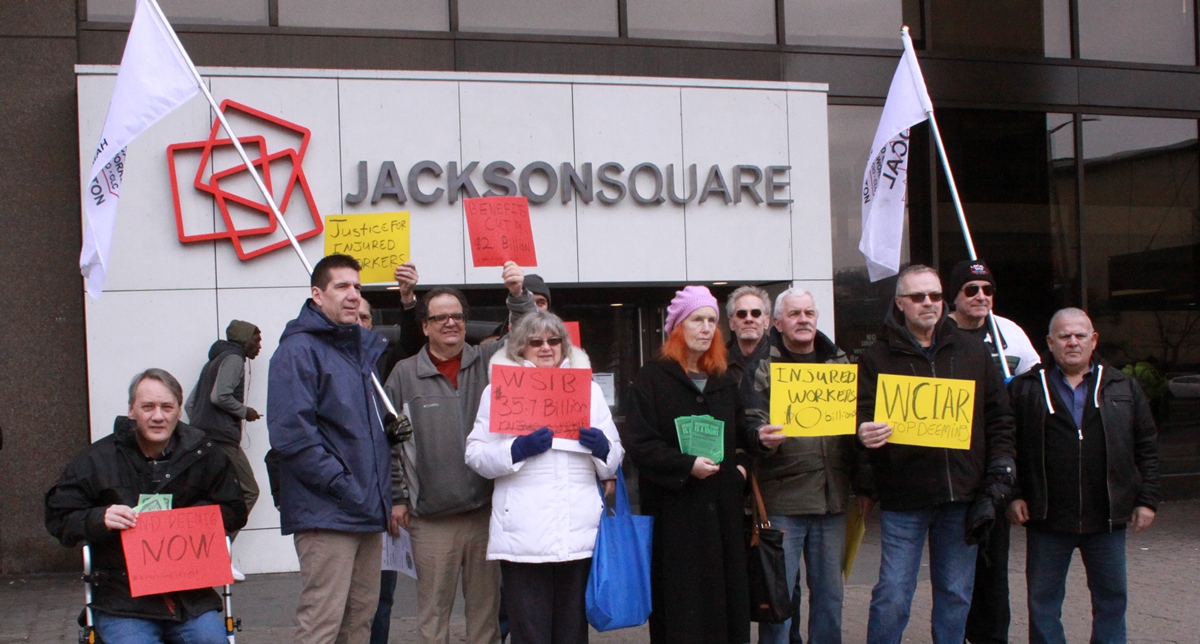
Barrie
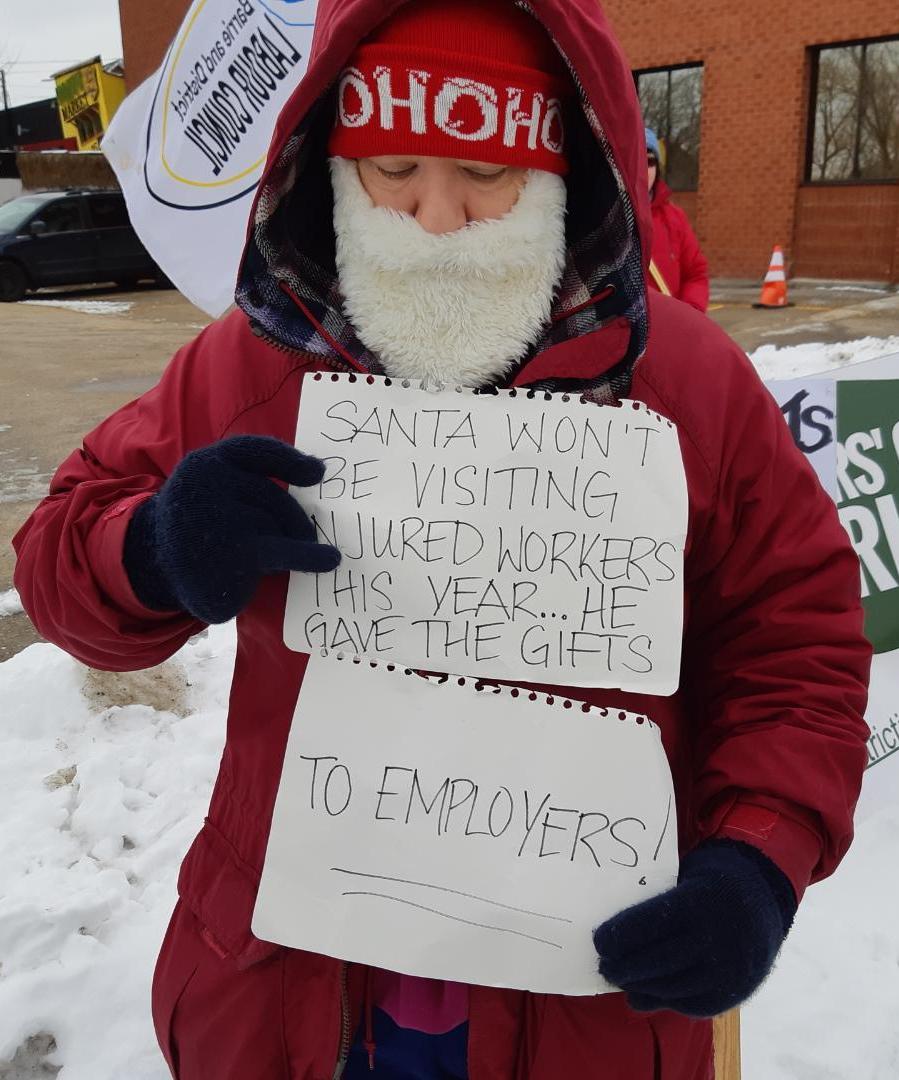 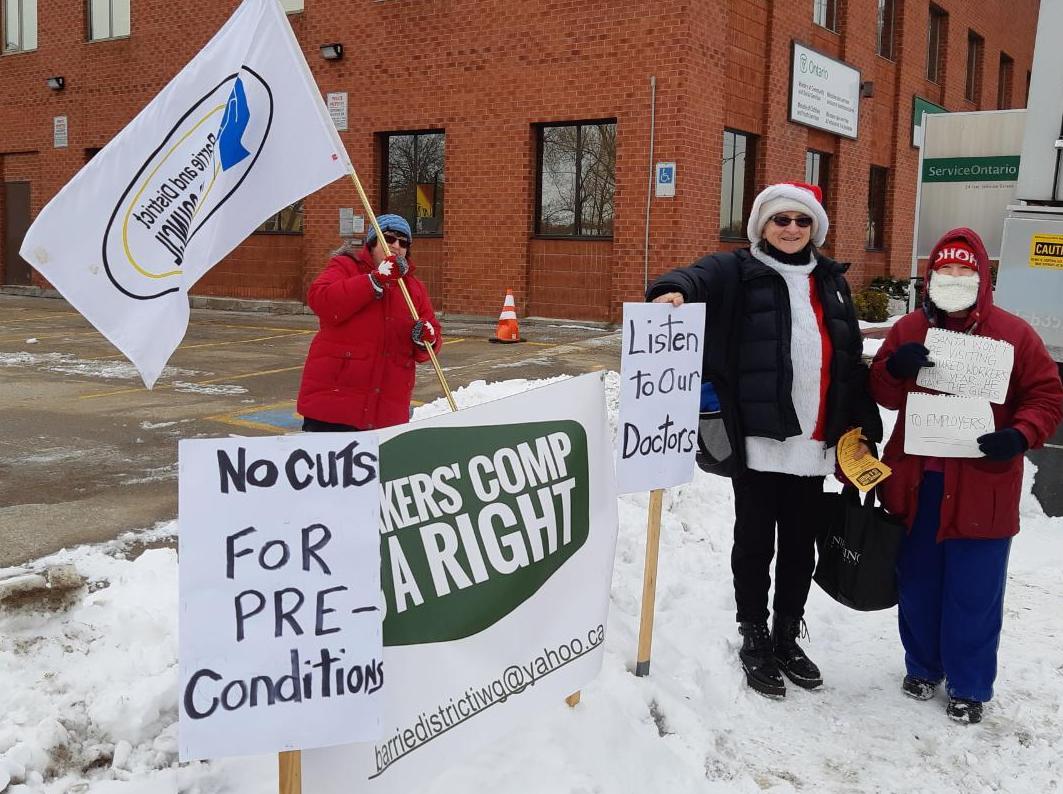
London
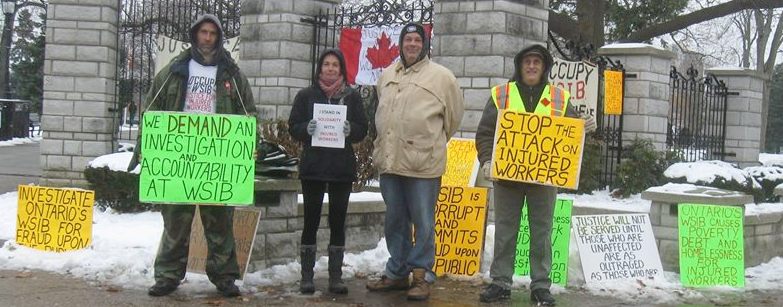
Windsor
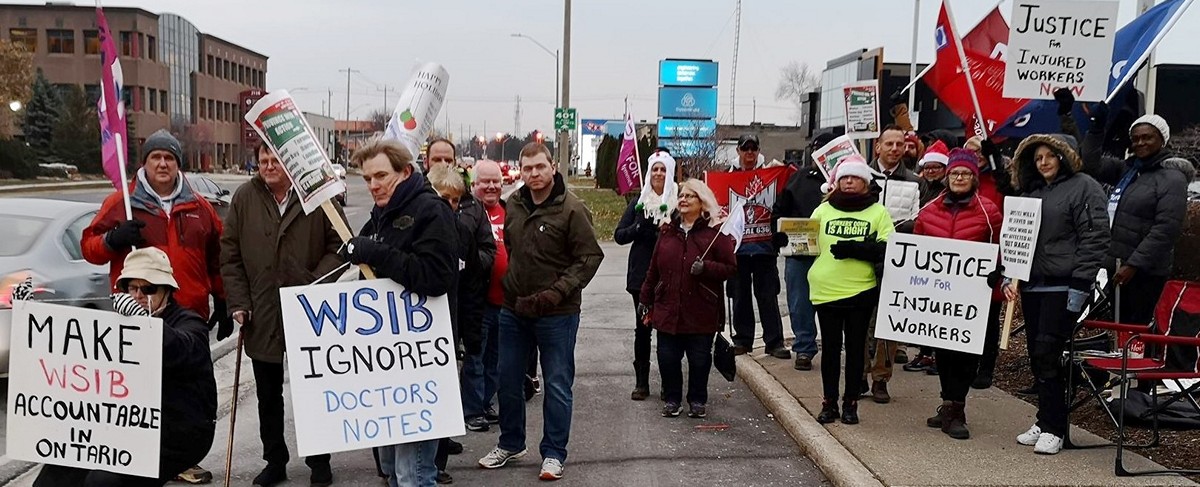
  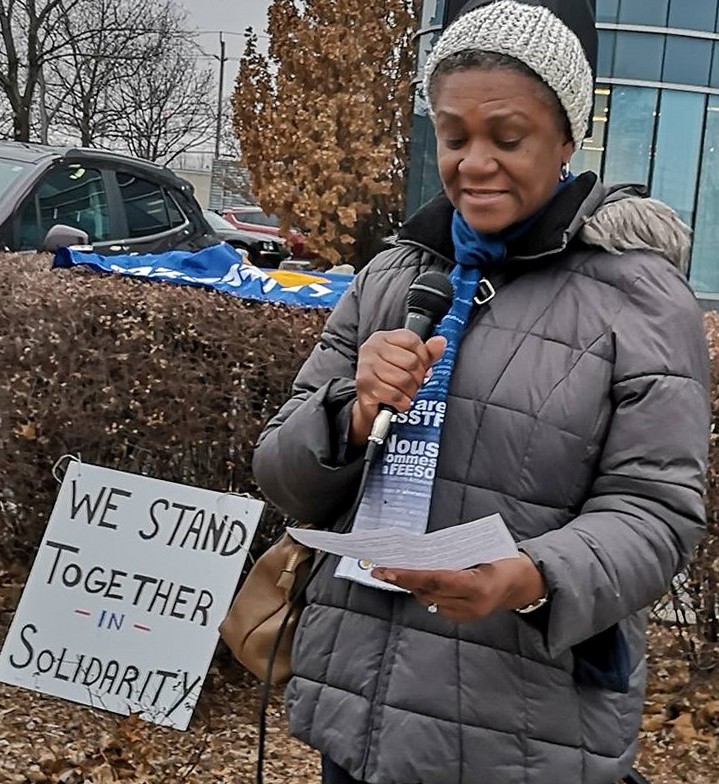


PREVIOUS
ISSUES | HOME
Website:
www.cpcml.ca
Email:
office@cpcml.ca
|

 In Toronto some 150
people participated in a rally outside the Ontario Ministry of Labour.
Injured worker activists from the ONIWG were joined by contingents from
the Toronto Council of
the United Steelworkers, UFCW, OPSEU, the Toronto local of CUPW, the
South Asian Women's
Rights Organization and the Workers' Centre of CPC(M-L), among others.
In Toronto some 150
people participated in a rally outside the Ontario Ministry of Labour.
Injured worker activists from the ONIWG were joined by contingents from
the Toronto Council of
the United Steelworkers, UFCW, OPSEU, the Toronto local of CUPW, the
South Asian Women's
Rights Organization and the Workers' Centre of CPC(M-L), among others.  ONIWG President Willie
Noiles pointed to the police presence at the action for the first time,
including the unsuccessful attempt to keep the rally off the Ministry
of Labour's stairs, and the fact the Minister of Labour did not attend,
as indicative of the contempt which the current Ontario government has
for injured workers and working
people.
ONIWG President Willie
Noiles pointed to the police presence at the action for the first time,
including the unsuccessful attempt to keep the rally off the Ministry
of Labour's stairs, and the fact the Minister of Labour did not attend,
as indicative of the contempt which the current Ontario government has
for injured workers and working
people.




























